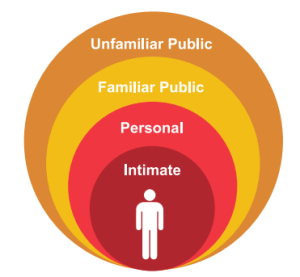Chapter 5: Opinions, Clarifying, and Filtering
Introduction
![]() Watch this chapter’s video. It takes place in Claire’s office in the campground.
Watch this chapter’s video. It takes place in Claire’s office in the campground.
Notice how Roshan and Gilles adjust how they speak when they realize that something they are thinking may not be appropriate to say. Notice how Gilles’ and Roshan’s body language changes when they realize they may be in someone else’s space or crossing a line, behaving in a way that might not be socially acceptable. Notice how Claire does or does not filter personal information in a public conversation.
Focus Questions
In this chapter, the relationships of acquaintances, neighbours, family members, and friends are affected when too much information (TMI) or too little information is shared.
Identifying Boundaries 
Some characters in this textbook feel comfortable handling private property that belongs to someone else; others feel uncomfortable doing the same thing. They easily chat about some topics but choose not to discuss others. Like Gilles, Roshan, and Claire, most of us also have unspoken and unseen boundaries, or limits, in both our conversations and our physical space.

Who is allowed to come into your space and use your belongings?
How comfortable are you when people open or use the things or enter the places listed in the table below?
1. Use a checkmark to show the kinds of relationships in which you are comfortable sharing the things and spaces that are listed.
| I think these items or spaces can be touched or entered by … | … only me | … people in a close personal relationship with me | … some familiar people | … anyone, including unfamiliar people |
|---|---|---|---|---|
| My cellphone | ||||
| My bag, purse, or wallet | ||||
| My pencil case | ||||
| My laptop | ||||
| My fridge | ||||
| My usual chair | ||||
| My bedroom |
Who do you talk with about certain topics? How comfortable are you when people discuss the topics listed in the table below?
Use a checkmark to show the kinds of relationships in which you are comfortable talking about the topics that are listed.
| I think these topics can be talked about in relationships that are … | … intimate | … personal | … familiar and public | … unfamiliar and public |
|---|---|---|---|---|
| My weight | ||||
| My age | ||||
| My conflicts with family, friends, or partners | ||||
| My love interests or relationship status |
2. Imagine that you hear a singer at a festival. You don’t like the singing or music at all. If the following people asked your opinion about the music, how would you answer?
Write the words you would say to each person listed in the table below.
| Who is asking? | What would you say? |
|---|---|
| 1. The singer, whom you just met for the first time | |
| 2. The singer, who is a friend of yours | |
| 3. Your best friend, who also heard the singer | |
| 4. The festival organizer | |
| 5. A music reviewer or blogger | |
| 6. An anonymous festival survey or suggestion box |
3. Read the descriptions on the left and on the right. Count how many points are most true for you.
Place the  on the line below on the dot closest to the way you share information and space.
on the line below on the dot closest to the way you share information and space. ![]()
| I’m not comfortable saying exactly what I think because it might hurt relationships. I don’t share strong feelings and opinions. This is my way of showing concern for people’s feelings. I’m not comfortable using strong words, high volume, speed, or gestures in difficult conversations. I’m not comfortable sharing some information or opinions with some people. I’m not comfortable sharing space with some people. |
I’m comfortable saying exactly what I think because it shows I care about the relationship. I’m comfortable showing strong feelings and opinions. This is my way of showing sincerity. I’m comfortable using strong words, high volume, speed, or gestures in difficult conversations. I’m comfortable sharing all kinds of information or opinions with most people. I’m comfortable sharing space with most people. |

Objectives
In this chapter, we will
- recognize differences between personal and public conversations
- compare how people share or filter the same information with different people in different ways
- identify social conventions around sharing, filtering, or withholding information
- look for patterns among what people think, what they say, and what they withhold
- adjust which words we choose and how much detail we give to be appropriate in personal or public conversations.
You will build up your language skills in
- vocabulary through context clues, synonyms, cognates, or word families
- accuracy through grammar practice with adjectives and adverbs, and pronunciation of verb endings
- fluency through writing and speaking tasks related to description and comparisons.

